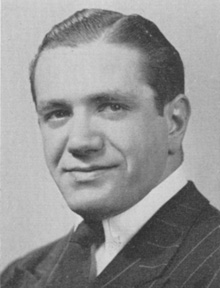A Purple Heart, found in a box of books bought at a yard sale in Pinehurst, N.C., by Kimberly Paller about a year ago, was awarded posthumously to 1st Lt. Henry A. Schenk ’43, killed in action during the Korean War. She found his name inscribed on the back of the medal and began a search to find his family.

Henry Schenk ’43
The first contact Paller received was from noted actor-author James McEachin of Hollywood, who had been searching for Schenk’s family ever since the war. He was one of only two survivors from the squad of soldiers ambushed in August 1952 during a mission to rescue American prisoners. Schenk led the mission and fought fiercely to try and save his men. McEachin, felled by a bullet in the leg, recalls seeing only one man still firing.
“It was Schenk,” McEachin is quoted in the story by Martha Quillin, News & Observer. “He was firing his weapon, and screaming and cussing at the enemy,” trying to draw fire so he could see where to shoot back. “He was the bravest man I’ve ever seen, or ever will see.”
McEachin, a Silver Star and Purple Heart recipient himself, wanted to find the family so that he could tell them about Schenk’s bravery and heroism, which saved his life.
Another person who became involved in the search was Capt. Zachariah Fike, a full-time Vermont National Guardsman who runs the nonprofit Purple Hearts Reunited. He was inspired to start the group as a result of his mother giving him an engraved Purple Heart she found in an antique shop in 2009. He tracked down the soldier’s family and returned it. Since then, Fike, who earned a Purple Heart during deployment to Afghanistan in 2010, has returned more than 50 medals.
Fike contacted Lafayette’s Special Collections for help in finding Schenk’s family. Diane Shaw, College archivist and director of special collections, worked with Fike over several weeks. They eventually made contact with Andrea Flagg, of Pinehurst, N.C., the daughter of Henry’s brother, Peter Schenk ’41, who served in the U.S. Army and U.S. Air Force, rising to the rank of colonel before retiring in 1980. He moved to Pinehurst, where he died in 2002.
Since Schenk’s body was never recovered, the Army listed him as missing in action on Aug. 15, 1952, and officially classified him as killed in action Jan. 10, 1954. Lafayette learned about Henry’s death because he had an insurance policy that would pay off his College debt if anything happened to him. The College returned the money to his wife.
Bob Becker ’51, who was Schenk’s roommate, discovered that Schenk’s name was not in the list of names of alumni who had died in the Korean War engraved on a bench in the College’s war memorial plaza in front of Alumni Gym (now Oechsle Hall). He worked with Bob Nourse, then director of estate planned giving and retired Army colonel, to have Schenk’s name added in spring 2000.
Schenk was studying economics when he was drafted in 1943 to fight in World War II. He returned in 1945, married, finished school with an ROTC commission, and joined the Army National Guard. While finishing at Lafayette, he wrote a book, Vintage ’37, that was never published. One of his essays–“The Tassel”–was included in the From Quill to Keyboard exhibit last year. He was summoned to active duty in Korea in 1951 or 1952.
His name is inscribed on the Courts of the Missing at the Honolulu Memorial in Hawaii. His other awards include Combat Infantryman’s Badge, Korean Service Medal, United Nations Service Medal, National Defense Service Medal, and Republic of Korea War Service Medal.
Return Ceremony Nov. 12
Paller met McEachin at the 60th Anniversary of the Korean War Armistice in Mobile, Ala., on July 27. She gave the Purple Heart to McEachin, who passed it along to Fike to have it framed in time for the return ceremony set for 2 p.m. Tuesday, Nov. 12, at the National Korean War Memorial in Washington, D.C. McEachin will present the Purple Heart to Schenk’s family.

1 Comment
I admit that I shed some tears over this story. It seems so odd that so many Purple Hearts (one of the highest military honors) could get separated from their rightful place with the soldier or his family members. It also struck me that so many of the stories of these courageous soldiers may never be known. Congratulations to Paller for not only returning the Purple Heart but bringing his story to light.
Comments are closed.